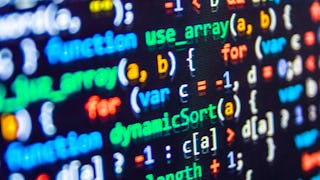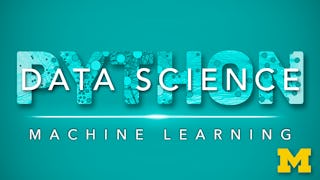Labs were incredibly useful as a practical learning tool which therefore helped in the final assignment! I wouldn't have done well in the final assignment without it together with the lecture videos!



Machine Learning with Python
This course is part of multiple programs.


Instructors: Joseph Santarcangelo
528,975 already enrolled
Included with 
(17,141 reviews)
Recommended experience
What you'll learn
Job-ready foundational machine learning skills in Python in just 6 weeks, including how to utilizeScikit-learn to build, test, and evaluate models.
How to apply data preparation techniques and manage bias-variance tradeoffs to optimize model performance.
How to implement core machine learning algorithms, including linear regression, decision trees, and SVM, for classification and regression tasks.
How to evaluate model performance using metrics, cross-validation, and hyperparameter tuning to ensure accuracy and reliability.
Details to know

Add to your LinkedIn profile
See how employees at top companies are mastering in-demand skills

Build your subject-matter expertise
- Learn new concepts from industry experts
- Gain a foundational understanding of a subject or tool
- Develop job-relevant skills with hands-on projects
- Earn a shareable career certificate from IBM


Earn a career certificate
Add this credential to your LinkedIn profile, resume, or CV
Share it on social media and in your performance review

Recommended if you're interested in Machine Learning

Arizona State University

University of Michigan
Why people choose Coursera for their career




Learner reviews
17,141 reviews
- 5 stars
76%
- 4 stars
18.59%
- 3 stars
3.41%
- 2 stars
0.97%
- 1 star
1.01%
Showing 3 of 17141
Reviewed on May 26, 2020
Reviewed on Dec 10, 2021
Great course, they teach the very basic steps for data analysis world, which is awesome so we can get a solid basics understanding, the tests are in a great level (neither too easy nor too hard).
Reviewed on Apr 18, 2020
This course was a great taster for machine learning techniques. My only recommendation would be to add more explanation on tuning techniques for models and cover more of the supporting mathematics.
New to Machine Learning? Start here.

Open new doors with Coursera Plus
Unlimited access to 10,000+ world-class courses, hands-on projects, and job-ready certificate programs - all included in your subscription
Advance your career with an online degree
Earn a degree from world-class universities - 100% online
Join over 3,400 global companies that choose Coursera for Business
Upskill your employees to excel in the digital economy
Frequently asked questions
Python’s popularity in machine learning stems from its simplicity, readability, and extensive libraries like TensorFlow, PyTorch, and scikit-learn, which streamline complex ML tasks. Its active community and ease of integration with other languages and tools also make Python an ideal choice for ML.
Machine learning engineers use Python to develop algorithms, preprocess data, train models, and analyze results. With Python’s rich libraries and frameworks, they can experiment with various models, optimize performance, and deploy applications efficiently.
Python offers a wide range of ML libraries, is beginner-friendly, and has great support for data visualization and model interpretation. It also supports rapid prototyping, making it easier to test and refine models compared to other languages like C++ or Java.
More questions
Financial aid available,

